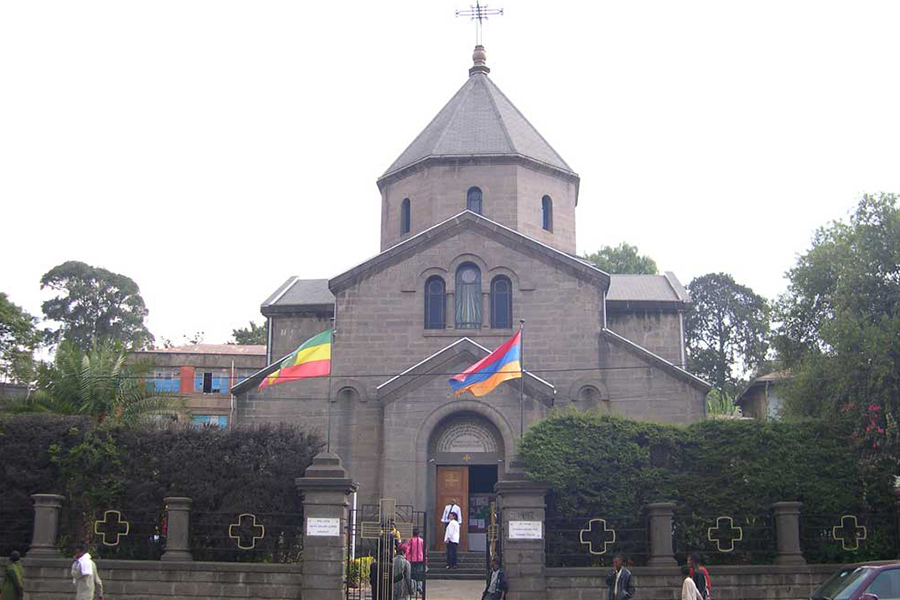
Agenda | Feb 09,2019
Addis Abeba City officials have taken it upon themselves to implement the year-long directive banning outdoor advertisement of alcohol along with weapons and explicit graphics while a permit from the Addis Abeba Construction Permit & Control Authority is required to put up any billboards and walls on public spaces.
Signed off by the previous head of the Authority Sitotaw Akele, the directive seeks to monitor Addis Abeba's visual landscape and control illegal advertisements, paintings and posters.
The new batch of reforms introduces zonal aesthetic standards compatible with city landmarks and infrastructure developments while entailing fees for damages and the cost of removal for advertisements posted without obtaining permits.
"They have to measure up to the city's aesthetics," said Addisu Melese, outdoor advertising director at the Authority.
He remarked that the un-coordination of efforts between different bureaus had made the implementation lag behind. Addisu revealed that around 10 advertising agents have acquired permits from the Authority so far, while he indicated that several stakeholders need to participate to enable proper control.
"It is becoming difficult to monitor every site on our own," he underscored. He said the new directive expects transport, tourism and beautification bureaus to uphold some degree of oversight over public advertisements.
Addisu believes several public spaces have been stormed with "unethical" images plastered in highly visible spaces while bringing down the capita's appeal.
Under the new reforms, outdoor art and advertisements displayed without approval from the Authority will be in direct violation of the law. Permits will be given through floated bids for main roads and roundabouts or through allotments for parks and railway ridges owned by the City Administration.
Abiy Ahmed's (PhD) Administration has been eyeing tourism as one of the major sectors in recent years as it has ramped up efforts to beautify the capital by building new attractions like museums and parks while demolishing shops made of tents under the guise of substandard aesthetics.
Senior Expert at the Addis Abeba Tourism Bureau, Memher Mekbeb, indicated that most advertisements had not taken the aesthetics of neighbouring structures or zonal standards into account.
He argues that advertisers should manage their competitive urges to outshine one another. While they are marking features of the urban landscape, Memher suggests visual contours of the city should be considered.
"The sizes are getting larger while colours are bolder," he told Fortune.
The Urban Beautification & Green Development Bureau has received a 1.4 billion Br budget for the year. Its officials embarked on the spirited adventure two months into the fiscal year, removing 1,000 advertisements.
Almaz Kebede, head of the urban beautification development monitoring directorate, insisted that advertisements need to meet the Green Development Goal of the government amidst the expansion of the urban population size.
"We are removing ads that clash with the green spaces," she said.
There are over 300 advertising agents licensed to operate in the capital by the Addis Abeba Trade Bureau, with most having expressed confusion over the regulatory framework for public ads in the past.
Esayas Gashaw, vice president of the Ethiopian Advertisement Association with 150 members, welcomes formalising procedures for public advertisements. The manager of Esayas Advertising with a yearly coverage of 4,000sqm applauds the current orientation to changing the landscape.
"It has no structure," he told Fortune, recalling his confusion on where to go to obtain permits or who the responsible authorities were.
"Nobody took responsibility," he said.
Conversely, the general manager of decade-old Berry Advertising, Melaku Beharu, points to the possible adverse outcomes of the new procedures as it could serve as a new bottleneck in a struggling industry.
Melaku has worked on promoting several brewery companies like Dashen Beer but has shifted towards less strict industries like banking and real estate over the past few years. "More than a dozen brewery advertisers have left the business," he told Fortune in a defeated tone.
While Melaku welcomes the creation of proper channels to obtain permits, he fears that even more advertisers will be pushed out of the business. He lamented that the government has failed to consider the role of street art in creating visually vibrant urban landscapes.
"It will crumple creativity if not kill it," he said.
Legal professionals point out that the absence of a proper regulatory framework has allowed unlicensed and illegal actors to operate in the sector.
Samuel Girma, a corporate lawyer, affirms it is within the Authority's mandate to regulate public spaces flooded by invasive images and advertisements. He emphasised that the lack of regulation had resulted in a chaotic and random atmosphere.
Samuel observes lack of coordination between several government bureaus has historically impeded regulating the urban advertisement landscape. He recommends increasing the manpower of the City Administration and improving integration between responsible bureaus to handle the problem in the long run.
PUBLISHED ON
Oct 28,2023 [ VOL
24 , NO
1226]

Agenda | Feb 09,2019

Fortune News | Jan 05,2019

Radar | Oct 12,2019

View From Arada | Apr 26,2025

Radar | Jun 24,2023

Agenda | Jul 07,2024

Fortune News | Oct 21,2024

Radar | Jul 18,2021

Radar | Oct 30,2021

Radar | Dec 11,2021

Dec 22 , 2024 . By TIZITA SHEWAFERAW
Charged with transforming colossal state-owned enterprises into modern and competitiv...

Aug 18 , 2024 . By AKSAH ITALO
Although predictable Yonas Zerihun's job in the ride-hailing service is not immune to...

Jul 28 , 2024 . By TIZITA SHEWAFERAW
Unhabitual, perhaps too many, Samuel Gebreyohannes, 38, used to occasionally enjoy a couple of beers at breakfast. However, he recently swit...

Jul 13 , 2024 . By AKSAH ITALO
Investors who rely on tractors, trucks, and field vehicles for commuting, transporting commodities, and f...

Nov 1 , 2025
The National Bank of Ethiopia (NBE) issued a statement two weeks ago that appeared to...

Oct 25 , 2025
The regulatory machinery is on overdrive. In only two years, no fewer than 35 new pro...

Oct 18 , 2025
The political establishment, notably the ruling party and its top brass, has become p...

Oct 11 , 2025
Ladislas Farago, a roving Associated Press (AP) correspondent, arrived in Ethiopia in...